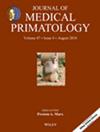Combined untargeted and targeted lipidomics approaches reveal potential biomarkers in type 2 diabetes mellitus cynomolgus monkeys
Abstract
Background
The significantly increasing incidence of type 2 diabetes mellitus (T2DM) over the last few decades triggers the demands of T2DM animal models to explore the pathogenesis, prevention, and therapy of the disease. The altered lipid metabolism may play an important role in the pathogenesis and progression of T2DM. However, the characterization of molecular lipid species in fasting serum related to T2DM cynomolgus monkeys is still underrecognized.
Methods
Untargeted and targeted LC–mass spectrometry (MS)/MS-based lipidomics approaches were applied to characterize and compare the fasting serum lipidomic profiles of T2DM cynomolgus monkeys and the healthy controls.
Results
Multivariate analysis revealed that 196 and 64 lipid molecules differentially expressed in serum samples using untargeted and targeted lipidomics as the comparison between the disease group and healthy group, respectively. Furthermore, the comparative analysis of differential serum lipid metabolites obtained by untargeted and targeted lipidomics approaches, four common serum lipid species (phosphatidylcholine [18:0_22:4], lysophosphatidylcholine [14:0], phosphatidylethanolamine [PE] [16:1_18:2], and PE [18:0_22:4]) were identified as potential biomarkers and all of which were found to be downregulated. By analyzing the metabolic pathway, glycerophospholipid metabolism was associated with the pathogenesis of T2DM cynomolgus monkeys.
Conclusion
The study found that four downregulated serum lipid species could serve as novel potential biomarkers of T2DM cynomolgus monkeys. Glycerophospholipid metabolism was filtered out as the potential therapeutic target pathway of T2DM progression. Our results showed that the identified biomarkers may offer a novel tool for tracking disease progression and response to therapeutic interventions.

 求助内容:
求助内容: 应助结果提醒方式:
应助结果提醒方式:


